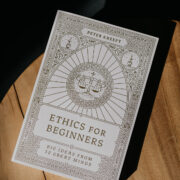The atheist Richard Dawkins said, “We are all atheists about most of the gods that humanity has ever believed in. Some of us just go one god further.” As the philosopher Bill Vallicella put it, “Given that everyone is an atheist with respect to some gods, one may as well make a clean sweep and be an atheist with respect to all gods.”
One way of understanding the “one God further” objection is as aimed at minimizing the differences between atheism and theism. The only difference between theism and atheism is just one. Virtually everyone already disbelieves in more than 99% of gods (Jupiter, Isis, Baal, the Golden Calf, Thor) and the atheist takes a short step further to disbelieve in 100%.
It is true that in some matters, a difference of one is irrelevant. One millimeter of pavement does not matter for a freeway. One eyelash fewer is irrelevant. One molecule less of coffee in your cup goes unnoticed.
But shall we also argue that there is no important difference between being married and not being married—just one spouse further? Is there no important difference between having a baby and not having a baby—just one child further? I doubt anyone could escape criminal prosecution by pleading, “Officer, I only killed one person, and after all there is no significant difference between killing one person and killing no persons, so I should be released from custody.” In some matters, the difference between one and none is enormously significant.
Sometimes, it may not be clear whether one fewer makes a difference. David Hume wrote, “How many languages are there, which you do not understand? The Punic, Spanish, Gallic, Egyptian, etc. With regard to all these, you are as if you were deaf, yet you are indifferent about the matter. Is it then so great a misfortune to be deaf to one language more?” Hume seems to imply a negative answer, but my answer to his question is that it is a great misfortune to be deaf to one language more. Most people who have lost their hearing seem to agree.
So, is the difference between atheism and theism like the difference on a plate of french fries between having one grain of salt or no grains of salt? Or is it more like having a baby or not having a baby?
In some matters, the difference between one and none is enormously significant.
Theist philosopher William Lane Craig remarked,
If God does not exist, life is ultimately meaningless. If your life is doomed to end in death, then ultimately it does not matter how you live. In the end it makes no ultimate difference whether you existed or not. Sure, your life might have a relative significance in that you influenced others or affected the course of history. But ultimately mankind is doomed to perish in the heat death of the universe. Ultimately it makes no difference who you are or what you do. Your life is inconsequential. Thus, the contributions of the scientist to the advance of human knowledge, the research of the doctor to alleviate pain and suffering, the efforts of the diplomat to secure peace in the world, the sacrifices of good people everywhere to better the lot of the human race—ultimately all these come to nothing. Thus, if atheism is true, life is ultimately meaningless.
God’s existence is not only a matter of ultimate significance in the end, it is a matter for meaning right here and right now, at least according to the atheist philosopher Jean-Paul Sartre. In his Existentialism and Human Emotions, Sartre pointed out that if God does not exist, then we are “condemned to be free.” Life is without meaning and absurd not just ultimately, but in our current situation. But what if both Craig and Sartre are mistaken about the relationship of God and meaning?
Even if that were true, atheists themselves give ample evidence that the question of God’s existence is a matter of significance. Why bother refuting a view if that view has no significance whatsoever? The efforts of atheists to show in their essays and books that there is no God is evidence that the question of God’s existence is tremendously significant.
Moreover, atheists themselves implicitly acknowledge that there is an enormous difference between there being one God and there being no God. Otherwise, the “one God further” objection can be put on its head. If a difference of one is irrelevant, then atheists might as well accept just one God more and become theists. But all atheists (and all theists) think there is a significant difference between theism and atheism. So the difference between one and none is a difference that matters to both atheists and theists.

Perhaps the “one God further” argument is best understood as a kind of inductive argument. We reject Hera, Baal, and Neptune, so we ought for similar reasons also to reject the God of Abraham. This way of construing the objection doesn’t minimize the difference between theism and atheism but rather argues for the superior rationality of atheism as more consistent.
This seems to be the defense of the “one God further” objection advocated by psychology professor Geoffrey Miller, who tweeted, “If you don’t believe in a god that hundreds of millions of other people do believe in, why don’t you? Ask yourself honestly. From their point of view, you’re an atheist.”
But if the Christian does not believe in Zeus, and the ancient pagan doesn’t believe in Jesus, neither one of them is an atheist. An atheist believes that no god at all exists. The ancient pagan and the modern Christian both affirm a divine realm, although they disagree about the number of divine entities. It is foolishness, not consistency, to reject my mother as my mother, even though I reject all other women on earth as my mother.
If I ask myself honestly why I began to believe in God, the answer is that my parents talked and acted as if God exists. Other folks, raised by atheist parents, presumably began to believe in atheism. The genetic fallacy indicates that the origin of a belief does not determine the truth of that belief. Being raised as a theist does not prove that atheism is true; being raised as an atheist does not prove that theism is true.
But Miller is inquiring perhaps not so much about how I began to believe that God exists, but rather why I still believe God exists. Having examined many arguments for and against God’s existence, like other philosophers (Alvin Plantinga, William Lane Craig, and Edward Feser spring to mind), I’ve come to the conclusion that it is entirely reasonable to hold that God exists. Some believe in God because of the beauty, the order, and the intelligibility of a world that is caused. Others believe in God because of the falsity of skepticism, or the call of conscience, or the desire of the human person for perfect Truth, Goodness, and Love. None of these arguments points to the existence of a god like Zeus, Marduk, Odin, or any other finite entity. All of these arguments point to the existence of God as understood by Augustine of Hippo, Thomas Aquinas, and Edith Stein. If even one of these arguments is sound, then it is rational to reject the “one God further” objection.
